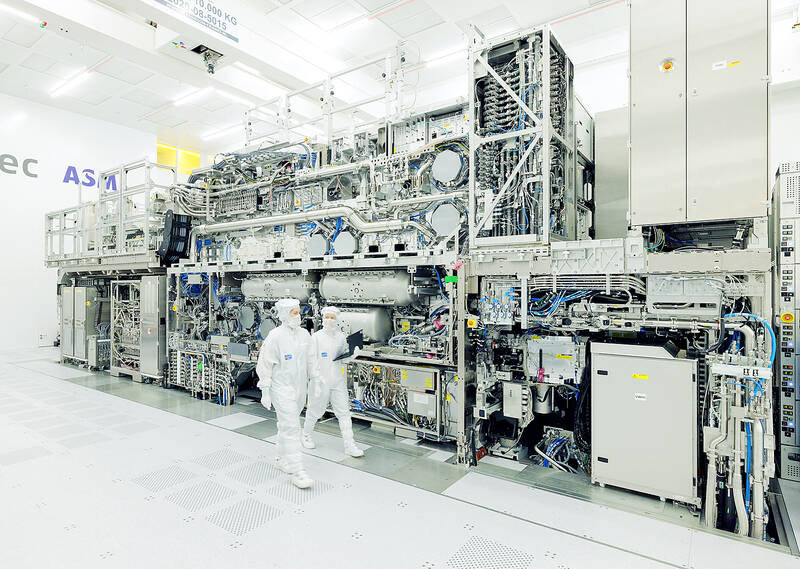ASML Holding NV and Taiwan Semiconductor Manufacturing Co (TSMC, 台積電) have ways to disable the world’s most sophisticated chipmaking machines in the event that China invades Taiwan, people familiar with the matter said.
Officials from the US government have privately expressed concerns to both their Dutch and Taiwanese counterparts about what happens if Chinese aggression escalates into an attack on the nation responsible for producing the vast majority of the world’s advanced semiconductors, two of the people said, speaking on condition of anonymity.
ASML reassured officials about its ability to remotely disable the machines when the Dutch government met with the company on the threat, two others said.

Photo: ASML / Michel de Heer via Reuters
The Netherlands has run simulations on a possible invasion to better assess the risks, they added.
Spokespeople for ASML, TSMC and the Dutch Ministry for Foreign Trade and Development Cooperation declined to comment. Spokespeople for the White House National Security Council, the US Department of Defense and the US Department of Commerce did not respond to e-mailed requests for comment.
The remote shut-off applies to Netherlands-based ASML’s line of extreme ultraviolet (EUV) machines, for which TSMC is its single biggest client. EUVs harness high-frequency light waves to print the smallest microchip transistors in existence — creating chips that have artificial intelligence uses as well as more sensitive military applications.
About the size of a city bus, an EUV requires regular servicing and updates. As part of that, ASML can remotely force a shut-off which would act as a kill switch, the people said.
The Veldhoven-based company is the world’s only manufacturer of the machines, which sell for more than 200 million euros (US$217 million) apiece.
ASML’s technology has long been subject to government interventions aimed at preventing it from falling into the wrong hands. The Netherlands prohibits the company from selling EUV machines to China, for instance, because of US fears they could lend its rival an edge in the global chip dispute.
The EUV machine has helped turn ASML into Europe’s most valuable technology stock with a market capitalization topping US$370 billion — more than double that of its client Intel Corp.
ASML has shipped more than 200 of the machines to clients outside China since they were first developed in 2016, with TSMC snatching up more of them than any other chipmaker.
EUVs require such frequent upkeep that without ASML’s spare parts they quickly stop working, the people said.
On-site maintenance of the EUVs poses a challenge because they are housed in clean rooms that require engineers to wear special suits to avoid contamination.
ASML offers certain customers joint service contracts where they do some of the routine maintenance themselves, allowing clients such as TSMC to access their own machines’ system. ASML says it cannot access its customers’ proprietary data.
TSMC chairman Mark Liu (劉德音) hinted in an interview with CNN in September last year that any invader of Taiwan would find his company’s chipmaking machines out of order.
“Nobody can control TSMC by force,” Liu said. “If there is a military invasion you will render TSMC factory non-operable.”

STEEP DECLINE: Yesterday’s drop was the third-steepest in its history, the steepest being Monday’s drop in the wake of the tariff announcement on Wednesday last week Taiwanese stocks continued their heavy sell-off yesterday, as concerns over US tariffs and unwinding of leveraged bets weighed on the market. The benchmark TAIEX plunged 1,068.19 points, or 5.79 percent, to 17,391.76, notching the biggest drop among Asian peers as it hit a 15-month low. The decline came even after the government on late Tuesday authorized the NT$500 billion (US$15.2 billion) National Stabilization Fund (國安基金) to step in to buoy the market amid investors’ worries over tariffs imposed by US President Donald Trump. Yesterday’s decline was the third-steepest in its history, trailing only the declines of 2,065.87 points on Monday and

TAKING STOCK: A Taiwanese cookware firm in Vietnam urged customers to assess inventory or place orders early so shipments can reach the US while tariffs are paused Taiwanese businesses in Vietnam are exploring alternatives after the White House imposed a 46 percent import duty on Vietnamese goods, following US President Donald Trump’s announcement of “reciprocal” tariffs on the US’ trading partners. Lo Shih-liang (羅世良), chairman of Brico Industry Co (裕茂工業), a Taiwanese company that manufactures cast iron cookware and stove components in Vietnam, said that more than 40 percent of his business was tied to the US market, describing the constant US policy shifts as an emotional roller coaster. “I work during the day and stay up all night watching the news. I’ve been following US news until 3am

Six years ago, LVMH’s billionaire CEO Bernard Arnault and US President Donald Trump cut the blue ribbon on a factory in rural Texas that would make designer handbags for Louis Vuitton, one of the world’s best-known luxury brands. However, since the high-profile opening, the factory has faced a host of problems limiting production, 11 former Louis Vuitton employees said. The site has consistently ranked among the worst-performing for Louis Vuitton globally, “significantly” underperforming other facilities, said three former Louis Vuitton workers and a senior industry source, who cited internal rankings shared with staff. The plant’s problems — which have not

TARIFF CONCERNS: The chipmaker cited global uncertainty from US tariffs and a weakening economic outlook, but said its Singapore expansion remains on track Vanguard International Semiconductor Corp (世界先進), a foundry service provider specializing in producing power management and display driver chips, yesterday withdrew its full-year revenue projection of moderate growth for this year, as escalating US tariff tensions raised uncertainty and concern about a potential economic recession. The Hsinchu-based chipmaker in February said revenues this year would grow mildly from last year based on improving supply chain inventory levels and market demand. At the time, it also anticipated gradual quarter revenue growth. However, the US’ sweeping tariff policy has upended the industry’s supply chains and weakened economic prospects for the world economy, it said. “Now